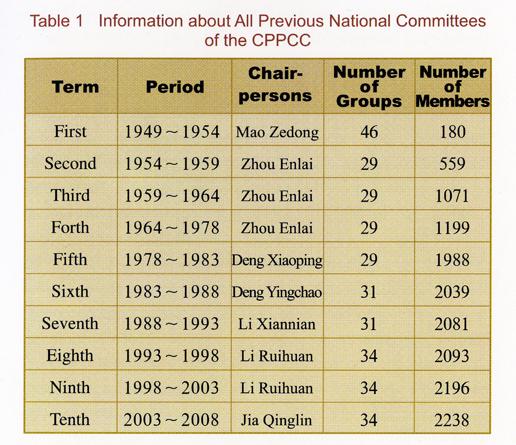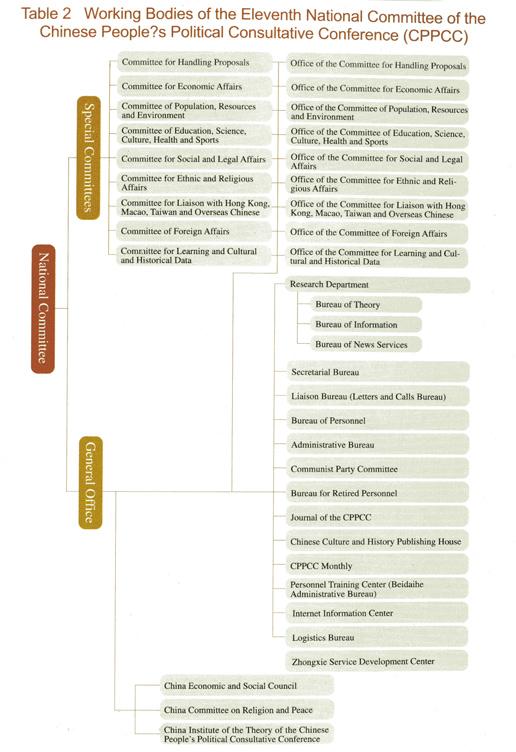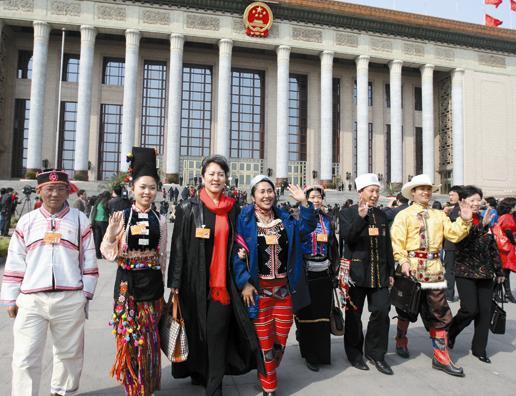The CPPCC has its National Committee and local committees.
The National Committee
The CPPCC National Committee is composed of representatives from the CPC, all democratic parties, personages without party affiliation, mass organizations, all ethnic groups, and sectors of society, compatriots from the Hong Kong Special Administrative Region, the Macao Special Administrative Region and Taiwan, returned overseas Chinese and specially invited public figures.
The National Committee of the CPPCC is elected for a term of five years. It has a Chairperson, Vice-Chairpersons and Secretary-general. For information about all previous National Committees of the CPPCC, see Table 1.

The First Session of the Eleventh CPPCC National Committee was inaugurated on March 3, 2008 in Beijing.
It has been 60 years since the First National Committee of the CPPCC. The Eleventh CPPCC National Committee is at present in office, with 2,237 members from 34 groups.
Chairman: Jia Qinglin
Vice-chairpersons: Wang Gang, Liao Hui, Du Qinglin, Ngapoi Ngawang Jigme (Tibetan), Pagbalha Geleg Namgyae (Tibetan), Ma Man Kei, Bai Lichen (Hui), Chen Kuiyuan, Abdul’ahat Abdulrixit (Uygur), Li Zhaozhuo (Zhuang), Huang Mengfu, Tung Chee-hwa, Zhang Meiying (female), Zhang Rongming (female), Qian Yunlu, Sun Jiazheng, Li Jinhua, Zheng Wantong, Deng Pufang, Wan Gang, Lin Wenyi (female), Li Wuwei, Luo Fuhe, Chen Zongxing ,Wang Zhizhen(female) and Edmund Ho Hau Wah.
Secretary-general: Qian Yunlu (concurrently)
The CPPCC National Committee’s Standing Committee is in charge of day-to-day affairs. The Standing Committee is composed of the Chairperson, Vice-chairpersons and Secretary-general of the National Committee and other members. Candidates for the Standing Committee are nominated from among the membership of the CPPCC National Committee by the parties, organizations, personages from ethnic groups and various sectors of society that participate in the CPPCC National Committee, and they are elected at a plenary session of the CPPCC National Committee. The Chairperson of the CPPCC National Committee takes charge of the work of the Standing Committee. The Vice-chairpersons and Secretary-general assist him/her in this work. The Chairperson, Vice-chairpersons and Secretary-general constitute the Chair’s Council, which handles the important day-to-day work of the Standing Committee.
The Standing Committee of the CPPCC National Committee exercises the following functions and powers:
(1) To interpret the Charter of the Chinese People’s Political Consultative Conference and supervise its enforcement;
(2) To convene and preside over plenary sessions of the CPPCC National Committee; to call, before the convocation of the first plenary session of a new National Committee, a preparatory meeting attended by all committee members to elect a presidium to conduct the first plenary session;
(3) To organize efforts to accomplish the tasks set forth in the Charter of the Chinese People’s Political Consultative Conference;
(4) To carry out decisions adopted at plenary sessions of the CPPCC National Committee;
(5) To examine and adopt important recommendations to be forwarded to the NPC and its Standing Committee or the State Council when the CPPCC National Committee is not in plenary session;
(6) To appoint or remove deputy secretaries-general of the CPPCC National Committee upon the proposal of the Secretary-general; and
(7) To decide on the establishment of any working body of the CPPCC National Committee or any change to such a body, and to appoint or remove its leading members.
To meet the needs of the work, the CPPCC National Committee has several special committees as well as other working bodies. The special committees operate under the direction of the Standing Committee and the Chair’s Council, and organize CPPCC National Committee members to carry out regular activities. Each special committee consists of a chairperson, several vice-chairpersons and members.
The Eleventh CPPCC National Committee has nine special committees, as follows:
1. Committee for Handling Proposals
2. Committee for Economic Affairs
3. Committee of Population, Resources and Environment
4. Committee of Education, Science, Culture, Health and Sports
5. Committee for Social and Legal Affairs
6. Committee for Ethnic and Religious Affairs
7. Committee for Liaison with Hong Kong, Macao, Taiwan and Overseas Chinese
8. Committee of Foreign Affairs
9. Committee for Learning and Cultural and Historical Data
The National Committee has a General Office that works under the direction of the Secretary-general and a number of deputy secretaries-general who assist the Secretary-general in his/her work.
For the working bodies of the Eleventh CPPCC National Committee, see Table 2:

The CPPCC National Committee has three national mass organizations — China Economic and Social Council, China Committee on Religion and Peace and China Institute of the Theory of the Chinese People’s Political Consultative Conference.
China Economic and Social Council
Established on July 2, 2001, the China Economic and Social Council is an organization which links mass organizations, research institutions, enterprises and public institutions in the economic and social fields as well as a national non-profit organization consisting of specialists and scholars from the economic and social fields and organizers and managers of the relevant units. Its purpose is to invigorate the economic and social fields, implement the Scientific Outlook on Development and engage in research, counseling and service for the promotion of coordinated economic and social development and the building of a harmonious society; to take an active part in the activities of the International Association of Economic and Social Councils and Similar Institutions (IAESCSI), strengthen ties with member organizations of the IAESCSI and economic and social research institutions in all countries and make contributions to developing China’s people-to-people diplomacy and promoting exchanges and cooperation between Chinese and overseas NGOs.
Its current Chairman is Wang Gang.
China Committee on Religion and Peace
The China Committee on Religion and Peace (CCRP) consists of representative figures from all the religions in China, including Buddhism, Taoism, Islam, Catholicism and Christianity. Established on July 2, 1994, it is a non-profit national mass organization with the status of an independent legal person. Its objectives include holding high the banner of friendship, peace, development and cooperation, maintaining fine tradition of loving the country, and religion, and cherishing peace in Chinese religious circles, taking the initiative to promote unity and harmony among all religious groups at home, expanding exchanges and cooperation with religious circles in all countries, the religion and peace organizations of other countries and those at regional and world levels, safeguarding the unification of the motherland, and striving for world peace and common development.
Its current Chairman is Pagballa Geleg Namgyae.
China Institute of the Theory of the Chinese People’s Political Consultative Conference
Established on December 20, 2006, the China Institute of the Theory of the Chinese People’s Political Consultative Conference(CITCPPCC) is a national academic organization engaged in research and publicity concerning the system of multiparty cooperation and political consultation led by the CPC and the theory of the CPPCC under the leadership of the CPPCC National Committee.
Its Honorary Chairpersons are Wang Gang, Du Qinglin, Chen Kuiyuan, Qian Yunlu,Wang Zhongyu and Luo Haocai. Its Chairman is Zheng Wantong.
Local committees
Local committees of the CPPCC are set up at three levels, i.e. in provinces, autonomous regions and municipalities directly under the Central Government; in autonomous prefectures and cities at prefectural level; and in counties, autonomous counties and cities at county level and districts under the jurisdiction of cities, where conditions are appropriate. By the end of 2008, there were 3,118 local CPPCC committees at all levels, with a total of 632,000 members.
Local committees of the CPPCC at all levels hold office for five years. The composition, formation, main responsibilities and organizational structure of the local committees and their standing committees are determined on the basis of the CPPCC Charter in light of actual conditions in their localities and the practice of the CPPCC National Committee.
Relationship between CPPCC Committees at Higher and Lower Levels
The CPPCC committees at higher levels give guidance to those at lower levels in the following main ways:
1. The leading members of the committees at lower levels observe the plenary sessions , standing committee meetings and other important working meetings of those at higher levels ;
2. The committees at higher levels hold meetings to share experience, and other meetings at regular and irregular intervals;
3. Chairpersons, vice-chairpersons and other leading members of the committees at higher levels make inspection tours of the committees at lower levels and provide guidance;
4. The committees at higher levels run training courses at regular and irregular intervals, in which the leadership, members and staff of those at lower levels receive training in respective periods and groups;
5. A complete information network has been set up to increase communication between the committees at higher and lower levels; and;
6. The committees at higher levels invite those at lower levels to conduct investigations and studies of important issues.
Groups participating in the CPPCC
The CPPCC consists of different groups, the nature of which is constantly adjusted along with changes in the domestic situation and economic and social structures .
There are 34 groups represtented in the Eleventh CPPCC National Committee, as follows:
1. The Communist Party of China (CPC);
2. The Revolutionary Committee of the Chinese Kuomintang;
3. The China Democratic League;
4. The China Democratic National Construction Association;
5. The China Association for Promoting Democracy;
6. The Chinese Peasants and Workers Democratic Party;
7. The China Zhi Gong Party;
8. The Jiu San Society;
9. The Taiwan Democratic Self-government League;
10. Personages without party affiliation;
11. The Communist Youth League of China;
12. The All-China Federation of Trade Unions;
13. The All-China Women’s Federation;
14. The All-China Youth Federation;
15. The All-China Federation of Industry and Commerce;
16. The China Association for Science and Technology;
17. The All-China Federation of Taiwan Compatriots;
18. The All-China Federation of Returned Overseas Chinese;
19. Literature and art Circles;
20. Science and technology Circles;
21. Social sciences Circles;
22. Economicsv Circles;
23. Agriculture Circles;
24. Education Circles;
25. Sports Circles;
26. Press and publication Circles;
27. Medicine and health Circles;
28. The group for friendship with foreign countries;
29. The group for welfare and social security;
30. Ethnic minorities;
31. Religious bodies;
32. Specially invited figures from Hong Kong;
33. Specially invited figures from Macao; and
34. Other specially invited figures
CPPCC Members
CPPCC members are selected through consultation and recommendation. The Standing Committee decides through consultation on the number of members and the candidates for each CPPCC National Committee after they are examined and approved by the Chair’s Council of the preceding CPPCC National Committee.
CPPCC members are personages who represent all areas and sectors of society in China, have social influence and are capable of participating in the deliberation and administration of state affairs.
CPPCC members are required to maintain close ties with the people, to get acquainted with and report the people’s desires and demands and to attend meetings and participate in activities organized by the CPPCC committees of which they are members.

CPPCC members from all areas and all walks of life
CPPCC members enjoy the following democratic rights - the right to vote, elect and stand for election at the sessions of their committees, to make suggestions and criticisms concerning the work of their committees, to fully air their opinions and participate in discussions of national policies and principles and important local affairs at the sessions and through their committees, to make suggestions and criticisms concerning the work of personnel in government departments, to report and expose violations of discipline or laws and participate in the investigations and checks of such violations, to freely declare their resignation from their committees, and request reconsideration if they are subject to the punishment of warning or dismissal from their membership. CPPCC committees shall protect their members’ democratic rights to perform their duties according to the law.
CPPCC members have the duty to abide by and carry out the Charter of the CPPCC and resolutions adopted at the meetings of their committees.
The Eleventh CPPCC National Committee has a total of 2,237 members, of whom 895, or 39.99 percent, are CPC members, and 1,342, or 60.01 percent, non-CPC members. There are 393 women members, accounting for 17.6 percent. There are members representing all China,s 56 ethnic groups. In addition, among the members are leaders from all of China’s major religious groups, compatriots from Taiwan, celebrities from all walks of life in Hong Kong and Macao, experts who are Chinese citizens of foreign descent and representative figures of new social strata that are emerging in the process of social change.


